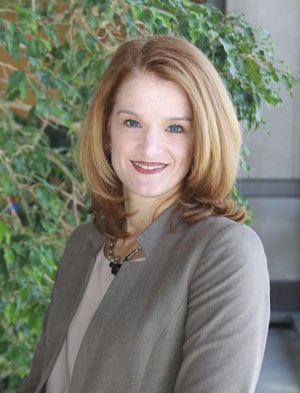UMass Medical School perinatal mental health expert Nancy Byatt, DO, has received two honors for her programs to improve maternal mental health outcomes.

On Dec. 2, the program that she founded and developed, the Massachusetts Child Psychiatry Access Program (MCPAP) for Moms, was named a winner in the success story category of the U.S. Agency for Healthcare Research and Quality Cross-Sectional Innovation to Improve Rural Postpartum Mental Health Challenge. She was awarded the 2020 Outstanding Psychiatrist Award for Clinical Psychiatry from the Massachusetts Psychiatric Society in November.
“We are excited that our work has impacted so many pregnant and postpartum individuals and their families in Massachusetts,” said Dr. Byatt, associate professor of psychiatry, obstetrics & gynecology, and population & quantitative health sciences. “It is especially exciting that this impact has become national as our model of perinatal mental health care spreads to other parts of the United States.”
The AHRQ challenge elicits narratives and proposals that address postpartum mental health in rural communities for the agency to share with health care systems, policymakers, state and federal partners, and the public. The COVID-19 pandemic has heightened the need for solutions to support population mental health, especially mothers experiencing postpartum mental health issues.
“We are pleased to be able to share and promote the important work you are doing in rural communities to take care of women and families facing barriers to accessing adequate care for postpartum mental health problems,” wrote Jaime Zimmerman, MPH, senior program advisor for the AHRQ Office of the Director.
Perinatal psychiatry access programs like those pioneered by Byatt are especially valuable for women and families in rural and other medically underserved areas where they face barriers to accessing adequate mental health care including cost, transportation and childcare. The COVID-19 pandemic makes filling these needs more urgent, as research suggests that higher stress during and after pregnancy is associated with increased postpartum depression.
The Massachusetts award recognizes contributions to the profession of psychiatry and evidence-based, high quality patient care. “Many pregnant or postpartum women’s lives and mental health have improved tremendously through the work which Dr. Byatt has done throughout the course of her career,” the society wrote in a press release.
As a reproductive psychiatrist, Byatt has established groundbreaking clinical programs to screen for, diagnose, treat and educate clinicians and patients about perinatal mood and anxiety disorders. As a physician-scientist, she focuses on improving maternal mental health care.
Byatt and colleagues at UMass Medical School developed the Massachusetts Child Psychiatry Access Program for Moms, funded by the Massachusetts Department if Mental Health. MCPAP for Moms makes expert psychiatric advice a phone call away for obstetricians, pediatricians and family medicine providers, who can access online training, screening, diagnosis and treatment toolkits, as well as telephone and face-to-face psychiatric consultation.
MCPAP for Moms inspired the development of Lifeline4Moms, a national program with ongoing federal funding focused on helping the health care community optimize maternal mental health. Byatt is the executive director and cofounder of Lifeline4Moms along with Tiffany Moore Simas, MD, MPH, MEd, chair and professor of obstetrics & gynecology.
Related stories on UMassMed News:
Nancy Byatt co-leading national study of mental health care for pregnant and postpartum women
NPR: Program developed at UMMS a ‘lifeline’ for mothers with postpartum depression
LISTEN: Perinatal experts discuss screening moms for postpartum depression